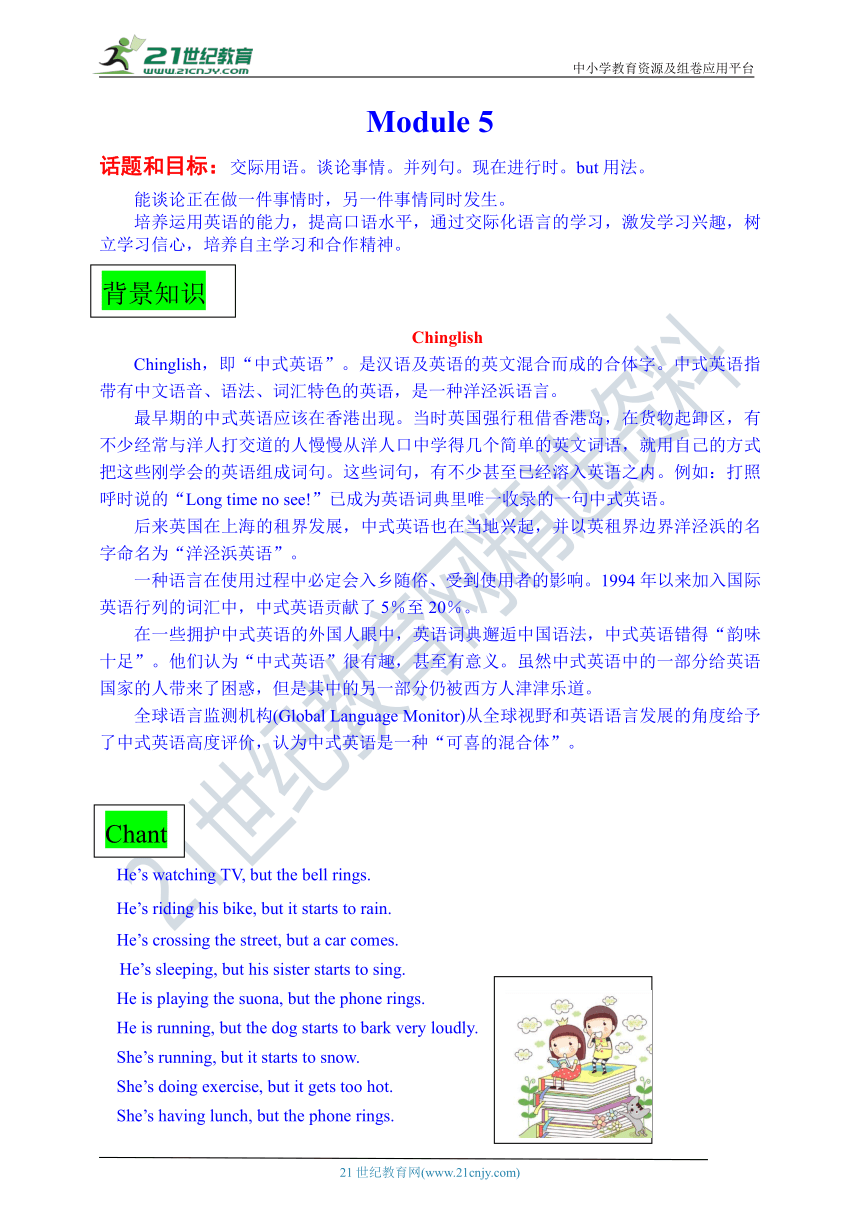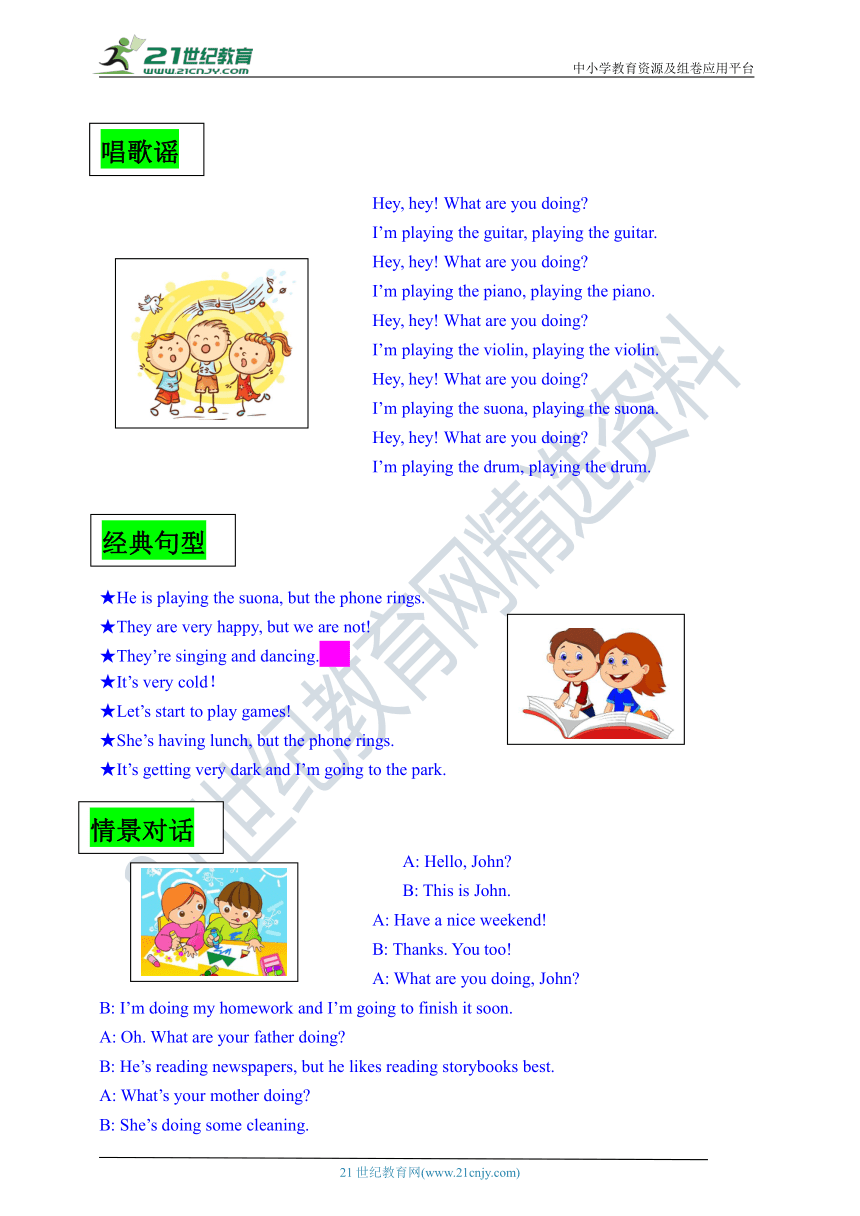外研版(三年级起点)六年级下学期用Module 5趣味英语读和练
文档属性
| 名称 | 外研版(三年级起点)六年级下学期用Module 5趣味英语读和练 |  | |
| 格式 | doc | ||
| 文件大小 | 1.2MB | ||
| 资源类型 | 试卷 | ||
| 版本资源 | 外研版(三年级起点) | ||
| 科目 | 英语 | ||
| 更新时间 | 2021-11-25 15:42:57 | ||
图片预览


文档简介
中小学教育资源及组卷应用平台
Module 5
话题和目标:交际用语。谈论事情。并列句。现在进行时。but用法。
能谈论正在做一件事情时,另一件事情同时发生。
培养运用英语的能力,提高口语水平,通过交际化语言的学习,激发学习兴趣,树立学习信心,培养自主学习和合作精神。
Chinglish
Chinglish,即“中式英语”。是汉语及英语的英文混合而成的合体字。中式英语指带有中文语音、语法、词汇特色的英语,是一种洋泾浜语言。
最早期的中式英语应该在香港出现。当时英国强行租借香港岛,在货物起卸区,有不少经常与洋人打交道的人慢慢从洋人口中学得几个简单的英文词语,就用自己的方式把这些刚学会的英语组成词句。这些词句,有不少甚至已经溶入英语之内。例如:打照呼时说的“Long time no see!”已成为英语词典里唯一收录的一句中式英语。
后来英国在上海的租界发展,中式英语也在当地兴起,并以英租界边界洋泾浜的名字命名为“洋泾浜英语”。
一种语言在使用过程中必定会入乡随俗、受到使用者的影响。1994年以来加入国际英语行列的词汇中,中式英语贡献了5%至20%。
在一些拥护中式英语的外国人眼中,英语词典邂逅中国语法,中式英语错得“韵味十足”。他们认为“中式英语”很有趣,甚至有意义。虽然中式英语中的一部分给英语国家的人带来了困惑,但是其中的另一部分仍被西方人津津乐道。
全球语言监测机构(Global Language Monitor)从全球视野和英语语言发展的角度给予了中式英语高度评价,认为中式英语是一种“可喜的混合体”。
He’s watching TV, but the bell rings.
He’s riding his bike, but it starts to rain.
He’s crossing the street, but a car comes.
He’s sleeping, but his sister starts to sing.
He is playing the suona, but the phone rings.
He is running, but the dog starts to bark very loudly.
She’s running, but it starts to snow.
She’s doing exercise, but it gets too hot.
She’s having lunch, but the phone rings.
Hey, hey! What are you doing
I’m playing the guitar, playing the guitar.
Hey, hey! What are you doing
I’m playing the piano, playing the piano.
Hey, hey! What are you doing
I’m playing the violin, playing the violin.
Hey, hey! What are you doing
I’m playing the suona, playing the suona.
Hey, hey! What are you doing
I’m playing the drum, playing the drum.
★He is playing the suona, but the phone rings.
★They are very happy, but we are not!
★They’re singing and dancing.
★It’s very cold!
★Let’s start to play games!
★She’s having lunch, but the phone rings.
★It’s getting very dark and I’m going to the park.
A: Hello, John
B: This is John.
A: Have a nice weekend!
B: Thanks. You too!
A: What are you doing, John
B: I’m doing my homework and I’m going to finish it soon.
A: Oh. What are your father doing
B: He’s reading newspapers, but he likes reading storybooks best.
A: What’s your mother doing
B: She’s doing some cleaning.
A: And what’s your brother doing
B: He’s playing with his dog outside, but it starts to rain.
A: Well. It’s time for lunch. Bye-bye.
B: Bye-bye.
并列句用法大曝光
并列句是英语中常见的句子类型之一,也是英语考试中的常考点,现在我们一起来认识认识并列句,希望大家对并列句有一个透彻的认识和理解。
并列句是指两个或两个以上的简单句,通过并列连词连在一起构成的句子,其基本结构是“简单句+并列连词+简单句”。
并列连词有:以and表示并列递进关系的并列连词,以but表示转折关系的并列连词,以or为代表的表示选择关系的并列连词,以so为代表的表示因果关系的并列连词,此外还有祈使句加and或or引导的并列句表示条件。并列句中的各简单句意义、定位和重要性相同,不分高低先后,相互之间没有从属关系,是平行并列的关系,因此叫并列句。它们的最明显特征就是句子之间用连词连接。
1. and表示并列递进关系。例如:
I am a pupil and my father is a worker. 我是学生,父亲是工人。
Mike likes basketball, and he plays basketball well.
迈克喜欢篮球,他篮球打得很好。
2. but表示转折关系。例如:
I like math, but my sister likes science.
我喜欢数学,但我姐姐喜欢科学。
We are playing hide-and-seek, but it begins to rain.
我们正在捉迷藏,但是天开始下雨了。
3. or表示选择关系。例如:
You may go to see a film with us, or you may stay at home.
你可以跟我们一起去看电影,也可以呆在家里。
You may come to my home, or I go to your home.
你可以来我家,或者我去你家。
4. so表示因果关系。例如:
It is very late, so we must go home at once.
很晚了,所以我们必须马上回家。
Tony is coming, so I must stay here and wait for him.
托尼就要到了,所以我必须呆在这儿等他。
5. 祈使句加and, or引导的并列句表示条件。例如:
Stand up and you’ll see the car.
如果站起来,你就会看到小汽车。
Hurry up, or you’ll miss the bus.
快点吧,否则你就会错过公共汽车。
常见Chinglish词汇大盘点
当中国人发明了“Good good study,day day up.(好好学习,天天向上。)”后,这个看起来有些雷人的句子就带领着Chinglish(中式英语)一路前进,再加上中式英语“long time no see(很久不见)”已成为标准英文词组,随之而来便出现了越来越多的Chinglish。下面我们来看看那些常见的Chinglish词汇。
jiao zi 饺子 tofu 豆腐 hot pot 火锅
honbao 红包 Kongfu 功夫 Tai Chi 太极拳
suona 唢呐 mahjong 麻将 Beijing Opera 京剧
New year's Day 元旦 the Spring Festival 春节
the Lantern Festival 元宵节 Mid-Autumn Day 中秋节
The Dragon Boat Festival 端午节 Double-ninth Day 重阳节
Teachers' Day 教师节 Chinese Youth Day 中国青年节
Ching Ming Festival/ Tomb-sweeping Festival 清明节
一天小强去看电影,到了电影售票处,发现一个老外和售票员连说带比好半天,就自告奋勇地上前做翻译。售票员说:麻烦你告诉她,现在坐票售完,只剩下站票,如果要看要站着看。小强转头就对老外说:No sit see, stand see. If see, stand see. 老外回答说:Sorry I don’t understand your English. 小强就对售票员说:哦,他说他不懂英文。
我会选。选择方框内的单词完成句子。
1. Lingling can speak English, _______ she can't speak French.
2. Jack always gets up early, _______ he is never late for school.
3. You go there first, _______ I go there first.
4. Work hard, _______ you’ll pass the exam.
5. Be careful, _______ you’ll slip.
“考点演练”参考答案
Module 5
1. B 2. D 3. C 4. A 5. C
背景知识
Chant
唱歌谣
经典句型
情景对话
学习方略
英语知识窗
趣味英语
考点演练
A. and B. but C. or D. so
21世纪教育网 www.21cnjy.com 精品试卷·第 2 页 (共 2 页)
HYPERLINK "http://21世纪教育网(www.21cnjy.com)
" 21世纪教育网(www.21cnjy.com)
Module 5
话题和目标:交际用语。谈论事情。并列句。现在进行时。but用法。
能谈论正在做一件事情时,另一件事情同时发生。
培养运用英语的能力,提高口语水平,通过交际化语言的学习,激发学习兴趣,树立学习信心,培养自主学习和合作精神。
Chinglish
Chinglish,即“中式英语”。是汉语及英语的英文混合而成的合体字。中式英语指带有中文语音、语法、词汇特色的英语,是一种洋泾浜语言。
最早期的中式英语应该在香港出现。当时英国强行租借香港岛,在货物起卸区,有不少经常与洋人打交道的人慢慢从洋人口中学得几个简单的英文词语,就用自己的方式把这些刚学会的英语组成词句。这些词句,有不少甚至已经溶入英语之内。例如:打照呼时说的“Long time no see!”已成为英语词典里唯一收录的一句中式英语。
后来英国在上海的租界发展,中式英语也在当地兴起,并以英租界边界洋泾浜的名字命名为“洋泾浜英语”。
一种语言在使用过程中必定会入乡随俗、受到使用者的影响。1994年以来加入国际英语行列的词汇中,中式英语贡献了5%至20%。
在一些拥护中式英语的外国人眼中,英语词典邂逅中国语法,中式英语错得“韵味十足”。他们认为“中式英语”很有趣,甚至有意义。虽然中式英语中的一部分给英语国家的人带来了困惑,但是其中的另一部分仍被西方人津津乐道。
全球语言监测机构(Global Language Monitor)从全球视野和英语语言发展的角度给予了中式英语高度评价,认为中式英语是一种“可喜的混合体”。
He’s watching TV, but the bell rings.
He’s riding his bike, but it starts to rain.
He’s crossing the street, but a car comes.
He’s sleeping, but his sister starts to sing.
He is playing the suona, but the phone rings.
He is running, but the dog starts to bark very loudly.
She’s running, but it starts to snow.
She’s doing exercise, but it gets too hot.
She’s having lunch, but the phone rings.
Hey, hey! What are you doing
I’m playing the guitar, playing the guitar.
Hey, hey! What are you doing
I’m playing the piano, playing the piano.
Hey, hey! What are you doing
I’m playing the violin, playing the violin.
Hey, hey! What are you doing
I’m playing the suona, playing the suona.
Hey, hey! What are you doing
I’m playing the drum, playing the drum.
★He is playing the suona, but the phone rings.
★They are very happy, but we are not!
★They’re singing and dancing.
★It’s very cold!
★Let’s start to play games!
★She’s having lunch, but the phone rings.
★It’s getting very dark and I’m going to the park.
A: Hello, John
B: This is John.
A: Have a nice weekend!
B: Thanks. You too!
A: What are you doing, John
B: I’m doing my homework and I’m going to finish it soon.
A: Oh. What are your father doing
B: He’s reading newspapers, but he likes reading storybooks best.
A: What’s your mother doing
B: She’s doing some cleaning.
A: And what’s your brother doing
B: He’s playing with his dog outside, but it starts to rain.
A: Well. It’s time for lunch. Bye-bye.
B: Bye-bye.
并列句用法大曝光
并列句是英语中常见的句子类型之一,也是英语考试中的常考点,现在我们一起来认识认识并列句,希望大家对并列句有一个透彻的认识和理解。
并列句是指两个或两个以上的简单句,通过并列连词连在一起构成的句子,其基本结构是“简单句+并列连词+简单句”。
并列连词有:以and表示并列递进关系的并列连词,以but表示转折关系的并列连词,以or为代表的表示选择关系的并列连词,以so为代表的表示因果关系的并列连词,此外还有祈使句加and或or引导的并列句表示条件。并列句中的各简单句意义、定位和重要性相同,不分高低先后,相互之间没有从属关系,是平行并列的关系,因此叫并列句。它们的最明显特征就是句子之间用连词连接。
1. and表示并列递进关系。例如:
I am a pupil and my father is a worker. 我是学生,父亲是工人。
Mike likes basketball, and he plays basketball well.
迈克喜欢篮球,他篮球打得很好。
2. but表示转折关系。例如:
I like math, but my sister likes science.
我喜欢数学,但我姐姐喜欢科学。
We are playing hide-and-seek, but it begins to rain.
我们正在捉迷藏,但是天开始下雨了。
3. or表示选择关系。例如:
You may go to see a film with us, or you may stay at home.
你可以跟我们一起去看电影,也可以呆在家里。
You may come to my home, or I go to your home.
你可以来我家,或者我去你家。
4. so表示因果关系。例如:
It is very late, so we must go home at once.
很晚了,所以我们必须马上回家。
Tony is coming, so I must stay here and wait for him.
托尼就要到了,所以我必须呆在这儿等他。
5. 祈使句加and, or引导的并列句表示条件。例如:
Stand up and you’ll see the car.
如果站起来,你就会看到小汽车。
Hurry up, or you’ll miss the bus.
快点吧,否则你就会错过公共汽车。
常见Chinglish词汇大盘点
当中国人发明了“Good good study,day day up.(好好学习,天天向上。)”后,这个看起来有些雷人的句子就带领着Chinglish(中式英语)一路前进,再加上中式英语“long time no see(很久不见)”已成为标准英文词组,随之而来便出现了越来越多的Chinglish。下面我们来看看那些常见的Chinglish词汇。
jiao zi 饺子 tofu 豆腐 hot pot 火锅
honbao 红包 Kongfu 功夫 Tai Chi 太极拳
suona 唢呐 mahjong 麻将 Beijing Opera 京剧
New year's Day 元旦 the Spring Festival 春节
the Lantern Festival 元宵节 Mid-Autumn Day 中秋节
The Dragon Boat Festival 端午节 Double-ninth Day 重阳节
Teachers' Day 教师节 Chinese Youth Day 中国青年节
Ching Ming Festival/ Tomb-sweeping Festival 清明节
一天小强去看电影,到了电影售票处,发现一个老外和售票员连说带比好半天,就自告奋勇地上前做翻译。售票员说:麻烦你告诉她,现在坐票售完,只剩下站票,如果要看要站着看。小强转头就对老外说:No sit see, stand see. If see, stand see. 老外回答说:Sorry I don’t understand your English. 小强就对售票员说:哦,他说他不懂英文。
我会选。选择方框内的单词完成句子。
1. Lingling can speak English, _______ she can't speak French.
2. Jack always gets up early, _______ he is never late for school.
3. You go there first, _______ I go there first.
4. Work hard, _______ you’ll pass the exam.
5. Be careful, _______ you’ll slip.
“考点演练”参考答案
Module 5
1. B 2. D 3. C 4. A 5. C
背景知识
Chant
唱歌谣
经典句型
情景对话
学习方略
英语知识窗
趣味英语
考点演练
A. and B. but C. or D. so
21世纪教育网 www.21cnjy.com 精品试卷·第 2 页 (共 2 页)
HYPERLINK "http://21世纪教育网(www.21cnjy.com)
" 21世纪教育网(www.21cnjy.com)
同课章节目录
- Module 1
- Unit 1 I want a hot dog,please.
- Unit 2 What do you want to eat?
- Module 2
- Unit 1 When are you going to eat?
- Unit 2 It will snow in Harbin
- Module 3
- Unit 1 The sun is shining.
- Unit 2 The cows are drinking wate
- Module 4
- Unit 1 The balloons are flying away!
- Unit 2 The apples are falling down the stairs
- Module 5
- Unit 1 He is playing the suona, but the phone ring
- Unit 2 He's riding his bike,but it's starting to r
- Module 6
- Unit 1 It was Daming's birthday yesterday.
- Unit 2 The name of the spaceship is Shenzhou V.
- Module 7
- Unit 1 He spent about twenty-one hours in space.
- Unit 2 She couldn't see or hear .
- Module 8
- Unit 1 Why do you have cups on your heads?
- Unit 2 Why are you wearing a hat?
- Module 9
- Unit 1 Best wishes to you.
- Unit 2 Wishing you happiness every day.
- Module 10
- Unit 1 We are going to different schools.
- Unit 2 What are you going to study?
- Review Module
- Unit 1
- Unit 2
